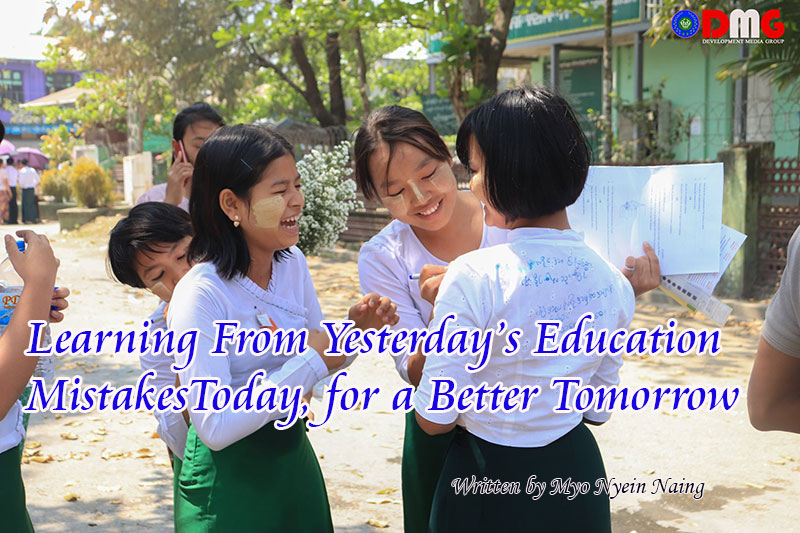- A Glimpse Into the 2026 Arakan State Parliament
- Junta airstrikes target military outposts seized by Arakan Army in Arakan State
- Motorbike spare part prices skyrocket in Arakan State amid tighter traffic rules
- Kyauktaw IDP camps struggle with inadequate latrines
- Religious freedom, interfaith harmony expand in areas controlled by AA in Arakan State
Learning From Yesterday’s Education Mistakes Today, for a Better Tomorrow
Schooling is a foundational part of early life. Everyone has their own stories, experiences, and souvenirs from their past educational lives, drawn from different schools in a disparate society.
01 May 2022

Written by Myo Nyein Naing
Schooling is a foundational part of early life. Everyone has their own stories, experiences, and souvenirs from their past educational lives, drawn from different schools in a disparate society.
The memories from school can be strong and enduring, but too often we do not consider the weaknesses, mistakes, and shortcomings of the education system in Myanmar. Our youngest and tenderest brains are not being well-served by the current educational framework, and the result is a slow-burn, systemic crisis.
Who to Blame?
A triangle symbol intended to represent education’s main stakeholders — students, teachers, and parents — can be seen in every single school, on the shoulders of school uniforms and on the covers of school books. However, a triangle does not adequately reflect the actions, agendas and decision-making of others who are also important actors and influencers when it comes to educating the nation’s up-and-coming generations.
Is education better symbolised as a pentagram, or hexagram, or decagram even? Regardless, what we know for sure is that the success or failure of an education system impacts entire communities, in Arakan State and beyond. Education is a societal issue. It stands to reason, then, that a better society could be built with a better national education system, if the foundation of that education system is grounded in a unity of stakeholders, firm supporting structures, and improved institutions.
It starts in the classroom, where students are taught using rote methodologies that do not emphasise important critical-thinking skills. Creativity languishes as the young brain seeks the easiest ways of “learning” based on passing exams. On this basis, good grades are all-important.
“Education is not the learning of facts, but the training of the mind to think,” Albert Einstein said. The reality of education in Myanmar, unfortunately, is that the learning of facts is prioritised, which can inhibit creativity and problem-solving skills in addressing real-world issues.
Students are thus inclined toward silence and social anxiety, leading to a lack of classroom participation. Thoughts of dropping out thrive in this environment, fueled by the same fear that teachers use as a favourite motivator and tool of control. The physical manifestation of this is often the cane stick, literally held by many teachers during instruction time as a reminder of the consequences of misbehaving. Yes, corporal punishment is alive and well in Myanmar’s schools.
Teachers and curriculum developers can and must do better, but so must our politicians and policymakers — in other words, our leaders. Facilities are crumbling or nonexistent, textbooks are outdated, desks are lacking. These are the results of insufficient government spending on education. Underinvestment in our future.
The government of the nation is to blame for those failings, but it is not just the responsibility of government when it comes to educational issues; every single person in the community has a part to play in bettering the education system, for the development of the nation; for the growing of young minds; for a future that looks more prosperous and equitable than the past.






.jpg)













